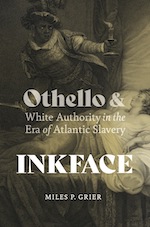Today, we are happy to bring you our conversation with Miles P. Grier, author of Inkface: Othello and White Authority in the Era of Atlantic Slavery
What inspired you to write this book?
Years ago, I was struck by the fact that every moor in Shakespeare’s plays has an intense encounter with literacy. Cleopatra screams for ink and paper, vowing to write Antony so many letters that she would depopulate Egypt in sending them by messenger. There’s related business with Aaron, Morocco, and Caliban. Most central to this book, Othello refers to Desdemona as “fair paper” with the word whore scrawled on it. When I first started researching this topic, scholars in the field told me that Othello has nothing to do with race, which they claim wasn’t invented until the late 18th century. So, I thought the best way to test that hypothesis would be to track Othello over the course of its first 250 years and see if any of its racial apparatus lasted over that span. When I found that both the page business and blackface endured, I had my title.
What did you learn and what are you hoping readers will learn from your book?
I learned that racism is not necessarily an idea or belief in some other group's inferiority. It doesn’t even require the scientific category of race. Instead, at a fundamental level, racism involves a habit of treating other people—including subordinate members of one’s own ‘race’—as marked for a certain life. Social inequality stems from this sometimes-literal overwriting of voices, bodies, and texts that testify to the injustice of their social order. We have to address that act and its effects if we want to undo the proliferating stigmas that now rely upon racial blackness as the emblem of the readable body.
What surprised you the most in the process of writing your book?
I was shocked to find that physicians of the seventeenth century speculated that Black Africans might have the same chemical composition as ink!
What’s your favorite anecdote from your book?
It’s very difficult to choose! There’s the so-called “Empress” of the Cherokees who commanded her attendants to stop a performance in Williamsburg during a sword fight. There’s the Desdemona who bolted up in bed after her character’s murder because someone in the theater shouted “Fire!” There’s Stephen Kemble, who played Othello opposite his new wife, blackened her face by kissing her too much, and made the show a farce. Othello generates a ton of anecdotes.
What’s next?
I would love to see performances that explore page props and black makeup as elements of Othello so significant that they have the potential to shift our understanding of the play's characters, genre, and tone. Beyond that, I look forward to writing about anything happening in Shakespeare or the early Atlantic world besides Othello for a good long while.





